|
|
|
Sort Order |
|
|
|
Items / Page
|
|
|
|
|
|
|
| Srl | Item |
| 1 |
ID:
108676
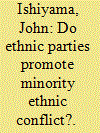

|
|
|
|
|
| Publication |
2009.
|
| Summary/Abstract |
Do ethnic parties exacerbate ethnic conflict? Many scholars have argued that the mere appearance of ethnic parties inevitably leads to a spiral of ethnic conflict and the collapse of incipient democracies. This article tests this proposition by examining how ethnic parties affect protest and communal conflict across 82 countries and 213 ethnic/communal groups from 1985-2003. Using a variety of quantitative techniques, I find that ethnic parties do mobilize minority ethnic groups to engage in protest, but there is no natural connection between the appearance of ethnic parties and the extent to which the minority group engages in communal conflict.
|
|
|
|
|
|
|
|
|
|
|
|
|
|
|
|
| 2 |
ID:
148243


|
|
|
|
|
| Summary/Abstract |
This paper examines the effects of truth and reconciliation commissions and peace committees on popular perceptions of the judicial systems of Africa. Using data from the Afrobarometer, and conducting mixed effects quantitative analysis, we test whether or not the use of truth and reconciliation commissions (TRCs) and peace committees led to greater popular trust in the courts. We find both cross-nationally, sub-nationally, and over time, the use of TRCs has not led to greater trust in courts (as is often claimed by its advocates), but find some support for the notion that they detract from trust in the judiciary. We suggest this is because such institutions have been established to compete with existing judicial practices, rather than complement and enhance them.
|
|
|
|
|
|
|
|
|
|
|
|
|
|
|
|
| 3 |
ID:
148119


|
|
|
|
|
| Summary/Abstract |
What impact does violence have on ethnic identity? Do acts of violence tend to create greater segmentation and “hardening” of identities among ethnic groups? In this article, we empirically assess the claim that violence inevitably leads to the hardening of ethnic identity (which we operationalize as expressions of ethnic particularism over a national identity). Using survey data from Kenya covering the period 2005–2008, integrated with geocoded data on conflict events in Kenya during that period, and employing multilevel logistic regression analysis, we do not find support for the contention that ethnic identity hardens inevitably as the result of violence. Rather, our findings suggest support for a more nuanced view of the effects of violence on ethnic identity.
|
|
|
|
|
|
|
|
|
|
|
|
|
|
|
|
| 4 |
ID:
052062
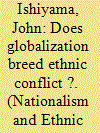

|
|
|
| 5 |
ID:
134242


|
|
|
|
|
| Summary/Abstract |
This paper analyzes the change in the composition of the North Korean elite from 1997–2010. It examines 256 public appearances by Kim Jong Il that were reported as an ‘inspection,’ ‘field guidance’ or ‘on-the-spot guidance’ visits. In particular, the paper examines 30 mentioned individuals who accompanied Kim Jong Il at least five times from 1997 to 2010 on these inspection tours. It finds that there was a great deal of volatility and change from 1999–2004 followed by a period of stability. Further, there was a shift away from a conservative perspective to a more moderate and pragmatic perspective surrounding the ‘Dear Leader.’ This has continued under the current leader, Kim Jong Un. The implications of this shift are discussed.
|
|
|
|
|
|
|
|
|
|
|
|
|
|
|
|
| 6 |
ID:
101427


|
|
|
|
|
| Publication |
2010.
|
| Summary/Abstract |
Ethnic identity is often cited as an important variable explaining voter choices in Africa. Ethiopia, since 1994, has adopted an ethnically-based federal system, which makes it an interesting test case of the importance of ethnicity in shaping voter preferences. Indeed, one might expect higher levels of ethnification of voter preferences in Ethiopia when compared to other African countries. Using cross-national data from the World Values Survey and Afrobarometer, it is found that Ethiopian voters have relatively higher levels of concentrated partisan support than do other African countries. However, when examining the propensity of individual voters to express partisan preferences that "defect" from their ethnic position, I find that the evaluations of government performance explain defections better than does the intensity of ethnic identity or expectations for patronage.
|
|
|
|
|
|
|
|
|
|
|
|
|
|
|
|
| 7 |
ID:
185513
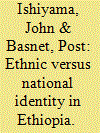

|
|
|
|
|
| Summary/Abstract |
In this article, we examine the growth of ethnopolitical divisions in Ethiopia. Using recently released Afrobarometer data and comparing current levels of ethnonational identity with previous data released in 2013, we find an erosion in support for a national Ethiopian identity, and rapidly growing ethnonational identities among Oromo and Tigrayan respondents, but not Amhara. This suggests that the attempts by Prime Minister Abiy Ahmed to promote ‘Ethiopianess’ as a unifying principle for the country will face great challenges. In addition, although it is tempting to lay the blame for this growing ethnonationalism at the ‘feet’ of the ethnofederal system in Ethiopia (as many scholars have) this study cannot directly address the connection between ethnic federalism and ethnic conflict and instability. However, what is clear is that there is a growing sense of ethnonationalism (or the idea that ethnic identity is now more important than a national Ethiopian identity) for a significant part of the population and this is consistent with the expectations of the critics of ethnofederalism. This also suggests greater challenges to Ethiopian unity in the near future.
|
|
|
|
|
|
|
|
|
|
|
|
|
|
|
|
| 8 |
ID:
089760
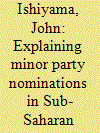

|
|
|
|
|
| Publication |
2009.
|
| Summary/Abstract |
To what extent do parties in Africa behave in ways similar to parties in new democracies elsewhere in the world? I examine nominations by the `minor' opposition parties to the single member districts for the legislative elections in Ethiopia, Malawi and Zambia. Using binary logit analysis, I found that generally the number of candidates running in a contest and the use of an `electoral arithmetic' by the parties explains whether they chose to nominate a candidate in a particular electoral district. However, the social demographic characteristics of districts appear to have little impact on whether or not a party nominates a candidate.
|
|
|
|
|
|
|
|
|
|
|
|
|
|
|
|
| 9 |
ID:
180216


|
|
|
|
|
| Summary/Abstract |
Ethiopia is currently undergoing a significant political transition, a transition that began with the ascendency of Abiy Ahmed as a new chairman of the Ethiopian People’s Revolutionary Democratic Front (EPRDF) and Prime Minister of the country. In a span of a little over a year, bold political reforms have been introduced. At the same time, these reforms have exacerbated ethnic tensions in the country. In a country that has experimented with ethnic federalism and where ethnicity is the main political organizing principle, the pressure towards ethno-national political movements is quite strong. This pressure has transformed the political identity of many groups, including the Amhara. Despite its longtime role as a major constituency for pan-Ethiopianist movements, many Ethiopians claim that the Amhara, the second largest ethnic group in Ethiopia, has recently exhibited a trend towards ethnonationalism. In this paper we explore two questions. First, is there evidence that an Amhara nationalism is emerging? And if so, what may be causing this? Using recent data from both the Afrobarometer and World Values Survey, we find a growing sense of defensive Amhara nationalism among Amhara respondents, although there is no indication of a general abandonment of the “Ethiopianist (Ethiopiawinet)” ideal. We argue that this defensive nationalism is a product of a “security dilemma” dynamic facing the Amhara as the result of the continuation of the “Oppressor/Oppressed” narrative that has been adopted by the EPRDF regime. This ethnonational appeal resonates with young Amhara males, and those who believe that their group has been unfairly treated by the current regime.
|
|
|
|
|
|
|
|
|
|
|
|
|
|
|
|
| 10 |
ID:
090679
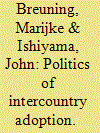

|
|
|
|
|
| Publication |
2009.
|
| Summary/Abstract |
What determines whether a country has more or less restrictive policies regarding intercountry adoption? Despite the growing importance of intercountry adoption as a political issue, and as an explicitly human face of globalization, there is virtually no systematic empirical work on intercountry adoption. We introduce a measure of the restrictiveness of the adoption laws in Sub-Saharan African countries and test possible explanations for the variations in legal restrictions on intercountry adoption among these countries.
Factors that are commonly cited as explanations for the restrictiveness of intercountry adoption policies do not hold up very well in our assessment. Openness to adoption is not determined by the severity of the orphan crisis or the AIDS crisis within the sending country, nor are democratic countries more responsive to the needs of their orphans. Additionally, African signatories to the Hague Convention, which aimed to increase transparency and accountability in intercountry adoption, tend to be among the most restrictive. On the other hand, a stronger connection with the global economy is associated with greater openness to intercountry adoption. We conclude with a discussion of the implications for orphans and for intercountry adoption.
|
|
|
|
|
|
|
|
|
|
|
|
|
|
|
|
| 11 |
ID:
109233
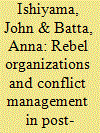

|
|
|
|
|
| Publication |
2011.
|
| Summary/Abstract |
How do the organizational features of rebel groups participating in civil wars affect the likelihood of the resumption of conflict after a civil war has ended? As many scholars have noted, peace duration is a function of the extent to which rebel groups stick to the deal. However, occasionally a rebel group fractures, and the conflict resumes as a result. Using a combination of existing data on civil conflicts and characteristics of the settlement agreement, along with original data on the characteristics of the insurgent organizations implementing the agreement, we test the effect of the organizational features of the rebel group on the duration of the peace settlements that occurred after the end of the cold war until 2009.
|
|
|
|
|
|
|
|
|
|
|
|
|
|
|
|
| 12 |
ID:
131536
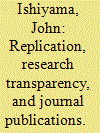

|
|
|
|
|
| Publication |
2014.
|
| Summary/Abstract |
Recently, the importance of research transparency via replication studies has been greatly discussed in most of the social sciences, political science included. Indeed, as Gherghina and Katsanidou (2013) and Freese (2007) note, to some extent, the discussion has been prompted by the tremendous changes in publishing in the past decade or so. With the enormous expansion in data availability and instant publication made possible by the Internet, there now are many opportunities to verify the findings presented in the discipline's major journals. "Replication, replication" has not only become the mantra for political science, but for economics, psychology, and quantitative sociology as well. These developments opened a debate on how to best "guard the high standards or research practice and allow for the maximum use of current knowledge for the further development of science" (Gherghina and Katsanidou 2013, 1; for similar sentiments see King 1995).
|
|
|
|
|
|
|
|
|
|
|
|
|
|
|
|
| 13 |
ID:
174592


|
|
|
|
|
| Summary/Abstract |
In this paper we empirically reexamine the debate over the conflict reducing properties of inclusive political institutions. We examine the purported violence reducing effects of proportional representation (PR) electoral systems, parliamentarism, and federalism, conditioning their effects on ethnic fractionalization and whether a country is conflict prone. In other words, are these institutions more effective in countries that have already experienced major conflict or are they more effective in preventing conflict in countries that have not experienced major conflict? Using a data set that includes a sample of 81 countries and 2488 observations from 1973 to 2018, we test the conditional effects of proportional representation electoral systems, parliamentarism and federalism conditioning these by ethnicity and whether the country has experienced a major conflict (i.e., civil war). We find that these institutions have little effect on reducing the number of riots or political deaths, but PR electoral systems reduces ethnic violence when ethnic fractionalization is high. On the other hand PR electoral systems and parliamentarism reduce ethnic violence in conflict prone countries, but federalism increases the likelihood of ethnic violence. We discuss the implications of these findings with regard to arguments regarding inclusive power sharing arrangements and violence in post conflict environments.
|
|
|
|
|
|
|
|
|
|
|
|
|
|
|
|
| 14 |
ID:
126022
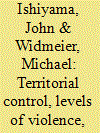

|
|
|
|
|
| Publication |
2013.
|
| Summary/Abstract |
This paper explores debates about electoral patterns in post-civil war societies. In particular, we examine whether the ability of rebels to capture and control territory and the level of violence at the local level explains the electoral performance of former rebel political parties, focusing on the Islamic Renaissance Party of Tajikstan (IRPT) and the Communist Party of Nepal (Maoist) (CPN (M)). Using data from the 2000 legislative election in Tajikistan and the 2008 Nepalese Constituent Assembly election, this paper finds that rebel control over districts did explain rebel party's electoral performance in Nepal. However, rebel control of districts in Tajikistan during the civil war did not predict the electoral performance in the first post-conflict election in that country. This is largely due to the disconnect between the IRPT and the constituencies that had supported it during the civil war, and because the level of control that the party exerted was far less than that of the CPN (M).
|
|
|
|
|
|
|
|
|
|
|
|
|
|
|
|
| 15 |
ID:
165503


|
|
|
| 16 |
ID:
098200


|
|
|
|
|
| Publication |
2010.
|
| Summary/Abstract |
In this article, we investigate the graduate curricula of political science programs and 122 Ph.D.-granting political science programs in the United States and how they seek to prepare political science teachers. We first investigate whether the department offers a dedicated political science course at the graduate level on college teaching, and whether the presence of this class correlates with the size of the department, the size of the university, the ranking of the department, and so on. We find that whether a program offers a graduate course on teaching is inversely related to the research productivity of a department, and that departments at public institutions are more likely to offer such courses than are departments at private institutions. Second, we conduct content analysis of a sample of syllabi from departments that offer such courses to ascertain the kinds of topics that are covered. Finally, we briefly describe some model programs that seek to prepare graduate students for teaching careers that integrate graduate student teacher training throughout the Ph.D. program.
|
|
|
|
|
|
|
|
|
|
|
|
|
|
|
|
| 17 |
ID:
160362


|
|
|
|
|
| Summary/Abstract |
What is the relationship between drug violence and political attitudes? In this article, we test the relationship between violence and trust using both individual and municipality data for Mexico from 2006 to 12. Using multilevel analysis, we find no support for the thesis that individual experiences with criminal violence drives trust, nor do we find a relationship between levels of violence at the municipio level and trust. However, we do find that perceived threats to individual security leads to less social and institutional trust, but this is independent of personal experience and whether the individual resides in violent communities.
|
|
|
|
|
|
|
|
|
|
|
|
|
|
|
|
|
|
|
|
|